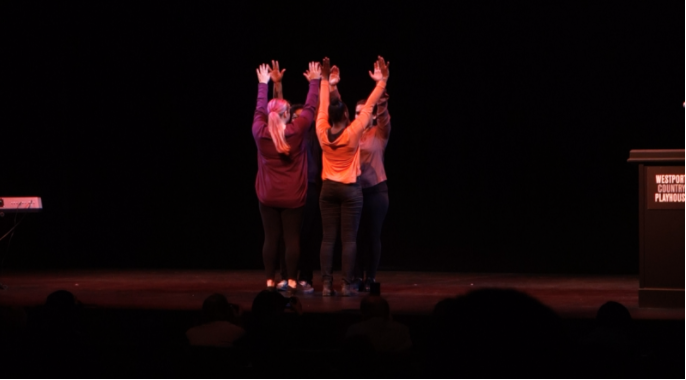By: Anna Rhoads ’19
“I have a dream that my four little children will one day live in a nation where they will not be judged by the color of their skin, but by the content of their character.”
These are the words of Dr. Martin Luther King, a civil rights activist who led the way for a movement against racism and inequality, and who was born on January 15, 1929.
For 11 years the Westport Country Playhouse has put together a celebration to honor Dr. King and educate people on his cause and why it is still relevant today. This year there was a successful turnout, all eager to listen to the performers and speakers. The Men’s Community Gospel Chorus of Norwalk sang various medleys including the “freedom song” and “Lift Every Voice and Sing,” while students of the Regional Center for the Arts Theater Department recreated poetry, “A World that Listens.”
“Racism is growing, and burning, and raging, throughout every land. Stop! We’ve got to stand together, hand in hand,” said the performers, Jahmelia Jarrett, Kaitlyn Olivia, Christina Boyle, and Sarah Williams.
Soon after, Professor Tricia Rose gave a speech entitled “What would Martin do in the era of post-race racism?” Professor Rose is the director of the Center for the Study of Race & Ethnicity in America at Brown University and according to the Westport Country Playhouse, “Professor Rose is an internationally respected scholar of post-civil rights era black U.S. culture, popular music, social issues, gender, and sexuality.”
Her speech focused greatly on the idea of color blindness. Psychology today defines the idea as “the racial ideology that posits the best way to end discrimination is by treating individuals as equally as possible, without regard to race, culture, or ethnicity.” Professor Tricia Rose explained that Dr. King did not want race to stop people from getting certain opportunities but he still wanted people to recognize the various cultures and races that people hold, and should be proud of.
Professor Tricia Rose also focused on how the problem remains today and Dr. King’s fight has still not ended.
Ellie Shapiro ‘17 recognized what the professor meant by this. “Celebrating Martin Luther King’s life and work is important to remind ourselves of the ongoing struggle for equality, not just between races but between genders, religious groups, and economic groups as well,” Shapiro said. “Many people think that racism and equality issues have been solved with the election of Barack Obama and the emergence of more and more women in positions of power. But it’s important to remember that racism and inequality most definitely still exist today and while we’ve come a long way they certainly aren’t solved.”
At the end of the celebration while the Men’s Community Gospel Chorus of Norwalk sang “Life Every Voice and Sing” the audience all stood up and sang with them. There was an overwhelming number of people who all together sang, “God of our weary years, God of our silent tears, thou who hast brought us thus far on the way; thou who hast by thy might led us into the light, keep us forever in the path, we pray.”














































